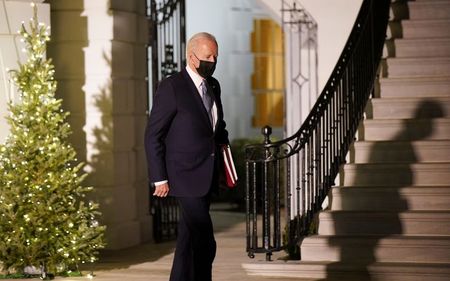By Trevor Hunnicutt and Andrea Shalal
WASHINGTON (Reuters) – The Biden administration on Monday vowed to crack down on “criminals, kleptocrats and others” paying cash for houses to launder money as part of a broader anti-corruption drive linked to this week’s U.S. Summit for Democracy.
Deputy Treasury Secretary Wally Adeyemo, speaking at the Brookings Institution think tank, pledged an “aggressive” push against suspicious all-cash home transactions, moves to beef up enforcement and intensified collaboration with allies.
President Joe Biden ordered officials in June to step up the fight against corruption. Their initial proposals are outlined in a 38-page U.S. national security strategy on countering corruption released Monday.
“Our real estate markets are at risk of becoming a safe haven for criminals, kleptocrats and others seeking to park corrupt profits,” Adeyemo said, noting that current law allows people to form companies anonymously to conduct all cash real estate deals that hide the source of funds.
All-cash real estate deals, which currently account for about one-third of all U.S. home sales, according to the National Association of Realtors.
Despite a 2016 push to force title insurance companies to report the identities of all-cash homebuyers, non-profit Global Financial Integrity estimates $2.3 billion has been laundered through the U.S. real estate market over the past five years.
Half of the transactions it reviewed involved “politically exposed” people at higher risk for bribery and corruption.
The latest U.S. moves come after a series of leaked documents, including October’s release of the Pandora Papers, raised questions about ways that government officials and others discreetly move money abroad, potentially to dodge taxes or accountability for wrongdoing.
The U.S. Treasury Department is crafting a new rule to close existing loopholes and require disclosures from certain types of U.S. and foreign companies to identify who is behind all-cash real estate transactions and see if those purchases are being used to shelter illegal profits.
Adeyemo said Treasury would ensure the cost of compliance did not harm small businesses, and should total no more than $50 per company.
The agency may also require that more investment funds, such as hedge funds and private equity vehicles, to engage in anti-money laundering efforts. And they expect to announce as soon as this week new efforts toward creating a database identifying the owners behind shell companies used to move money anonymously.
Adeyemo said Treasury had sanctioned 216 targets using anti-corruption authorities, including Monday’s designation of a Democratic Republic of Congo national accused of providing funds to blacklisted Israeli investor Dan Gertler.
Biden is hosting a virtual democracy summit on Thursday and Friday with 110 participants as part of an effort to confront what his administration sees as authoritarian forces led by China and Russia.
(Reporting by Trevor Hunnicutt; Editing by Heather Timmons and Alistair Bell)











